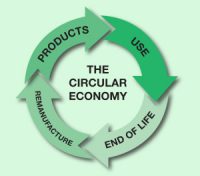A minister from the department of environment, food and rural affairs (Defra) hinted at the country’s approach.
Let’s Recycle reported on Defra under-secretary Lord Gardiner of Kimble, who was said to have “offered an insight into the government’s position” on the EU’s circular economy package, in which he indicated that the UK government “may be open to adopting some measures set out by Brussels”. He responded to a written question in the House of Lords from Labour Peer Baroness Jones, who’d asked if the government intended “to integrate the EU’s circular economy package into UK legislation”.
Gardiner’s response was that the UK government “would judge ‘which areas’ of the package and the EU’s circular economy action plan it could focus attention on”, but that it “remains unclear when negotiations on the waste legislative amendments […] will conclude”. As a result of this, he pointed out that “it is difficult to forecast when the deadline for transposing any new EU legislation on waste into domestic law will come into effect”.
The EC reported it would be axing its plans in January 2015, before reconsidering and revealing it would increase funding, launching a public consultation both UKCRA and ETIRA contributed to. However, reports suggested it would dilute any circular economy package, and doubted their potential. Despite this, the new package was launched in December 2015 and adopted that month, with a packaging waste recycling target of 75 percent for member states by 2030.
The package received a funding boost of around €24 billion ($26.3 billion) from the EU soon after, though it “will take more than” a year to implement despite having been said to be “progressing well” in April, before being questioned again in June. The EU also previously revealed it was planning “tough” enforcement, while other areas warned earlier this year that the package could be seen as a “threat” to certain stakeholders.
One recent development saw Germany allegedly plan to “call for removal of EU recycling targets”, though rumours suggested the plan could be approved early next year, and recently concerns were raised that it might be “watered down”. In the last month, the Commission approved a further investment of €222.7 million ($246.1 million), while a report analysed business practices. The EU recently met with China to discuss collaboration, and the proposals are “due to be approved by MEPs in early 2017, before further review by the European Council”.
Gardiner added that “as long as the UK remains a member state, all EU obligations will apply and any future changes will be subject to full scrutiny and parliamentary debate”, noting that the package “has two elements: an action plan and amendments to waste legislation. There will be a series of initiatives launched under the action plan and the UK will be able to judge which of these to focus attention on in the future.
“We do not know when the negotiations on the waste legislative amendments will conclude, nor the deadline for transposing them into UK legislation”. Business have “sought clarity” on the UK’s position on EU waste legislation since the Brexit vote in June, but Defra “has yet to offer a clear position” on the circular economy, with its resources minister Thérèse Coffey reiterating its reluctance to back the 65 percent by 2030 recycling target as this is “too high to be achievable”.
